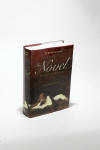May BASIC Issue
|
So Defoe Was a Latecomer?
by Dennis Donaghue
Don't tell that to Steven Moore. In "The Novel: An Alternative History," he holds that the novel actually began about 4,000 years ago. The earliest example he gives is "The Tale of Sinuhe," an Egyptian story about the picaresque adventures of a royal attendant; Mr. Moore dates it from the 20th century B.C. But since "The Tale of Sinuhe" in translation is only about 12 pages long, he urges us to call it "a mininovel."
To enforce his "alternative history" standard, Mr. Moore employs a questionable tactic: He designates as novels just about any fictional narrative, whether it is written in prose or verse or a mixture of the two; whether it is long or short, tells one story or many. Any style is acceptable. He brushes aside the standard distinctions between novels, romances and confessions: He simply designates all works of fiction as novels or proto-novels or "mininovels."
The problem with this tactic is that it doesn't exclude anything. "The Odyssey," "The Iliad," "The Aeneid," "The Divine Comedy," "The Canterbury Tales" are novels if you say that they are: They tell stories, they have characters, they feature beginnings, middles and ends. But if you put every work of fiction on the same shelf, you soon find yourself wanting to make distinctions, devising smaller units to acknowledge that "The Tale of Sinuhe" is not at all like "Robinson Crusoe" and that "Robinson Crusoe" is not much like "Bleak House."
Persist in such differentiations and you'll find yourself back where the standard account of the rise of the novel began, except that you needn't correlate the novel with the emergence of a particular social class. That exception is evidently congenial to Mr. Moore, because his likes and dislikes seem not to be related to social distinctions. He is happy to divide the novel along geographical and racial lines. So we have chapters on varieties of the "novel": Egyptian, Hebrew, Greek, Roman, Irish, Icelandic, Byzantine, Jewish, Arthurian, Italian, Spanish, French, Indian, Arabic, Chinese. Oh, yes, and the English novel.
Mr. Moore likes long, difficult novels that ask to be read, he thinks, as stylish performances: He approaches them in the same spirit as that of watching a ballet or a figure-skating competition. "The reason some of us consider [Joyce's] Ulysses the greatest novel ever written is not because it has a gripping story, lovable characters, or unique insights into the human situation, but because it is the most elaborate rhetorical performance ever mounted, making wider and more masterful use of all the forms and techniques of prose than any other novel."
Andrew Wylie: Super Lit
Andrew 'the Jackal' Wylie reveals how he became the feared king of the literary jungle and agent to the book world's biggest names – Salman Rushdie, Philip Roth and Martin Amis
These are the agents who report to the elusive figure of Andrew Wylie, an American literary bull on first-name terms with many of the greatest writers at work today, from Selman Rushdie and Chinua Achebe to VS Naipaul and Philip Roth.
Their boss is an enigmatic figure. He is also undeniably one of the most powerful man in the books industry. On the eve of the London event, he gave the Observer a rare and fascinating interview in a surprisingly anonymous Manhattan office.
We spoke in the late afternoon, but most mornings in New York City, Wylie is up at 5am, "staggering about in the dark", he says, before settling down to tackle between 40 and 50 emails from as far afield as Tokyo, St Petersburg and Cairo. This self-professed global literary agent, who represents about 700 writers, dead and alive, including Martin Amis, Vladimir Nabokov, Saul Bellow, Alaa al Aswany, Arthur Miller and Art Spiegelman, certainly has the spooky pallor of a man who does a lot of business in the dark.
Today he comes to greet me in the tranquil, overheated hallway of his 12th-floor office as the day closes and the evening light merges into the fluorescent glare of uptown off-Broadway. In person, Wylie is slight, courteous and soft-spoken – as if with his dark suit and formal good manners he can live down his reputation as competitive, self-willed, transgressive and ruthless.
The contrast between his polite self-presentation and his erstwhile reputation as a hell-raiser and "a lizard" makes for an edgy formality. But it doesn't take long for his sardonic bad-boy self to break through the mask. Wylie's minimalist office displays several promotional copies of the Nabokov backlist in various foreign editions. When I comment on the number of literary estates (Borges, Mishima, Waugh, Lampedusa and Updike, to name some of the most prominent) controlled by the Wylie Agency, he says, with a mirthless laugh: "People are dying like flies." It's at moments like this that you can see why, in the Anglo-American book world, he is known, simply as "the Jackal".
Once a more than slightly feral predator, however, Wylie has now become something far more menacing in the literary undergrowth. In a business environment where many of the principal publishers, booksellers and rival literary agents are reeling from the remorseless depredations of recession and digitisation (the IT revolution), he can make a good claim to be the most powerfully composed and uniquely global writers' representative on either side of the Atlantic, a king of the book publishing jungle.
From Our "Hmmm, Isn't There a Book In Here Somewhere?" Department
What's interesting is that your mix of bacterial species is unique. In fact, the UC researchers estimate that any two people share only about a dozen of the different species. That made the researchers curious: Could these species leave traces that might be identified like fingerprints?
They swabbed a few computer keyboards and quickly had an answer. Each person who used the keyboards left a unique bacterial trail. And these trails have staying power. The keyboards were left in the open, exposed to direct sunlight and dramatic changes in temperature and humidity.
"There's a rain forest of bacteria on your skin," said lead author Noah Fierer, an assistant professor of ecology and evolutionary biology at the University of Colorado at Boulder. A human hand can contain on average about 100 different species of bacteria, he said, and only about 13% of that makeup is shared between any two people. That leaves a lot of user-specific and potentially identifiable bacteria.
Fierer and colleagues compared the bacteria found on people's computer mice with a database of bacteria collected from the hands of 270 individuals. The bacterial colonies from the computer mice most closely matched those of the owner's hands, the scientists found.
The technique was 70 - 90 percent accurate overall, but that accuracy range could be increased as the technology becomes more sophisticated, according to Fierer.
Other problems would have to be worked out as well. For example, if more than one person has touched an object, it isn't yet possible to sort out their mixed-up bacterial signatures, said David A. Relman, a Stanford University professor who has studied the signatures left by gut and mouth bacteria.
Also, according to Relman, the distribution of bacterial species might change once the microbes have left the human hand, making the pattern less easy to link to a person.
"It's intriguing because it suggests a new approach to forensics," said Dr. Martin J. Blaser, chairman of medicine at New York University, who wrote a commentary accompanying the report. However, he said, "this is not ready for prime time."
Teens Target of
by Nick Clark
Anna Rafferty, the digital managing director for Penguin in the UK, said: "We want to develop peer-to-peer capabilities and have plans for a full social network. I would love to have teenagers tagging their favourite books and sharing it with their friends."
She hopes the site will become an important part of a teenager's social networking portfolio. "We want to allow elegant integration with other sites. For example, it would be good if tagging a book on Spinebreakers would show up in your Facebook newsfeed," she said.
Hay House Partners with Author Solutions, Inc.
Strategic Partnership Opens Self-Publishing Avenue for Authors
"We receive thousands of manuscripts annually, but we can publish only 100 products a year," said Reid Tracy, CEO of Hay House. "Our self-publishing division, Balboa Press, has been formed to allow many more people get their message out. While these books won't be published by Hay House, Balboa Press will be monitored for success, and hopefully we'll find the Hay House authors of the future," Tracy added. "This is the legacy of Louise Hay-25 years later-she wants to help the next generation find their voice."
Through this strategic partnership, Author Solutions will manage Balboa Press on behalf of Hay House, taking responsibility for selling and delivering a comprehensive array of publishing, marketing, and book-selling services, designed specifically for Balboa Press authors.
Konrath Signs Directly with Amazon
On his blog Konrath poses and answers some questions not covered in the press release:
Q: You signed a print deal? I thought you weren't signing any more print deals. A: I signed a print deal with a company that can email every single person who has every bought one of my books through their website, plus millions of potential new customers. I've never had that kind of marketing power behind one of my novels. I'd be an idiot not to do this.
Q: Aren't you going to piss off traditional publishers? A: Traditional publishers had a chance to buy Shaken last year. They passed on it. Their loss. Their big loss. Their big, huge, monumental, epic fail.
Bits & Bytes For thousands of additional listings, become an AmSAW Professional Member Today FICTION Debut Zoetrope All-Story Short Fiction Contest winner Bernie McGill's first novel THE BUTTERFLY CABINET, based on a true event, revealing what really happened on the last day in the life of 4-year-old girl, from the alternating points of view of her mother, accused of killing her, and a former nanny who wants to unburden herself of a 70-year secret, to Wylie O'Sullivan at Free Press, for publication in summer 2011, by Anna Stein on behalf of Clare Alexander at Aitken Alexander Associates (NA).
Mystery/Crime Arthur Godwag's THE NEWHATE, an examination of the links between the extreme right of today and its historical antecedents like Father Coughlin and the Protocols of the Elders of Zion, to Edward Kastenmeier at Pantheon, by Victoria Skurnick at Levine Greenberg Literary Agency (NA).
Women's/Romance Paula Graves's untitled book 4 of a new continuity series for Harlequin Intrigue, to Allison Lyons at Harlequin, in a nice deal, for publication in October 2011.
Karen Marie Moning's three novels that will spin off from her New York Times bestselling Fever series, again to Shauna Summers at Delacorte Press, by Amy Berkower at Writers House (NA). Moning's graphic novel, linking the events of the Fever series with those of her new trilogy, to Betsy Mitchell at Del Rey.
General/Other Epic Games and #1 NYT bestselling author Karen Traviss's fourth and fifth books in the GEARS OF WAR series, to Anthony Ziccardi at Gallery, with Ed Schlesinger editing, in a major deal, by Creative Artists Agency.
Children's: Young Adult School librarian Jesse Karp's THOSE THAT WAKE, pitched as "YA Philip K Dick," about a seventeen year old Brooklyn boy and a privileged suburban girl who, after their identities are abruptly wiped out, uncover a reality-shattering truth lurking just under the surface of a dystopian New York City, to Julia Richardson at Houghton Mifflin Harcourt, in a six-figure deal, in a pre-empt, for publication in Spring 2011, plus a sequel, by Jason Anthony and Will Lippincott at Lippincott Massie McQuilkin (NA).
NONFICTION Cooking Quick and Easy Vegan Comfort Food author Alicia Simpson's QUICK AND EASY VEGAN CELEBRATIONS, offering festive menus and great-tasting recipes for holidays and get-togethers throughout the year, again to Matthew Lore at The Experiment, in a nice deal, for publication in fall 2010 (world). matthew@theexperimentpublishing.com
History/Politics/Current Affairs Dr. Steve Hallett & John Wright's THE NEW AGE OF ENERGY: Collapse and Rebirth at the End of the Petroleum Interval, the most comprehensive and up-to-date analysis of the end of the fossil fuel era and the tremendous impact it will have on the world economy and modern culture, to Steven Mitchell at Prometheus Books, for publication in 2011, by Alison Picard (World).
Memoir Kristen Brozina's story of how her single father, an elementary school librarian, read aloud to her every night from the time she was in fourth grade until the day she left for college, depicting the insights they gained from the books they shared together and the bonding experience that resulted, as recently reported in an NYT article, to Karen Kosztolnyik at Grand Central, in a pre-empt, by Jennifer Gates of Zachary Shuster Harmsworth Literary Agency (World).
Narrative GQ and Wired writer Jason Fagone's GENIUS IS NOT A PLAN, a narrative about four teams furiously competing to win the $10 million Progressive Automotive X Prize for the design of a clean, production-capable car that gets more than 100 mpg, also offering a look at the past and future of automotive innovation; the engineering of cars; and the archetype of the classic American inventor, to Rachel Klayman at Crown, in a good deal, by Larry Weissman at Larry Weissman Literary (world). Foreign: kschulze@randomhouse.com
|
More Breaking Book News
The following book-industry
news appears in real-time as it becomes
available in order to meet your ever-expanding need to know
what's happening (and to whom) on Publisher's Row.
| Books & Authors - MagPortal.com |
|
|







